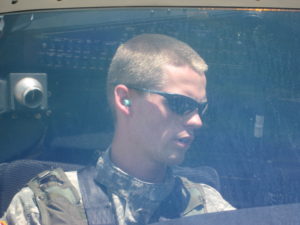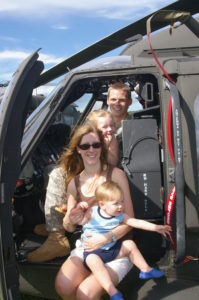New Year’s Eve 2010. In a military hospital in Hawaii with much of the staff away for the holidays, Army pilot Ben Groen learned he’d been diagnosed with T cell lymphoblastic non-Hodgkin lymphoma, a rare, aggressive cancer of the white blood cells and lymph nodes. His doctor told him that his treatment – which would need to begin almost immediately and require months of hospitalization – would exceed the capacity of the base’s blood bank.
On January 2, Groen and his two young children were on a plane for Boston. His parents picked the kids up at the airport and Groen went directly to Brigham and Women’s.
“A huge shock”

For someone who was 24 years old and had survived the rigors of Army boot camp and flight training, the diagnosis of cancer was, Groen says, “a huge shock. When they told me I had cancer, I said, ‘From what?’ I thought only older people got cancer.
His initial symptoms were more bothersome than alarming and easy to dismiss as the result of acclimating to Hawaii. “I was having trouble breathing at night; I had to prop myself on pillows so I could breath easily enough to fall asleep. My running became more and more labored,” he says. “I thought it might be a result of allergies, of the different vegetation in Hawaii. Another soldier told me everyone gets a funny feeling when they first get here; it takes time to adjust.”
It took several months of testing before a biopsy revealed that he had lymphoma.
As an Army captain and pilot of Black Hawk helicopters, Groen was trained to handle dangerous situations: cancer was an enemy with an unexpected face. “As the Army sees it, danger is a risk that has to be mitigated,” he relates. “That’s how I approached my treatment. Life is dangerous, war is dangerous, cancer is dangerous. You’ve got to find a way around it.”
Groen’s youth and stamina led doctors to prescribe a particularly intense form of therapy, normally reserved for children and adolescents with the disease. Though likely to be grueling, the protocol would improve his chances of survival to more than 85 percent, according to his oncologist, David Steensma, MD.
“Children with this type of cancer are usually cured, but adults generally don’t do as well,” Steensma says. “We’re learning that this difference may be partly because adults with such tumors receive treatments that aren’t as rigorous as those for children and adolescents. For more than a decade, my colleague Daniel DeAngelo, MD, PhD, has been working with pediatric cancer specialists at Dana-Farber’s Jimmy Fund Clinic to design treatment protocols for younger adults that are similar to what children receive. For younger adults who are fit and have no major health problems other than cancer, this regimen is very attractive, even though it is complicated and lengthy.
“Due to his physical training, Ben was about as physically fit as you can possibly be,” Steensma continues. “He has also had fantastic support from his family. He often brings his wife and children to the clinic when he’s getting a treatment, and it has been a real joy for our staff to see the little ones’ energy and follow their progress as they get bigger. But this treatment is still a hard road. Ben has had an incredibly positive attitude throughout and has approached his entire treatment without complaining – just like you’d expect from a good soldier, and from a mentally and physically strong young man.”
Bouncing back
The first five months of chemotherapy treatment were, Groen admits, “tough,” but

not quite as difficult as he’d been led to expect. “There were periods of physical pain, discomfort, and nausea, but fewer than I thought there’d be – not every day. I braced myself for a really bad time, but it never really came.”
After tapering off from the cycles of intense chemotherapy last summer, Groen bounced back quickly as his disease went into complete remission. He’s now at “99 percent” of his former health, he says, running, working out, and playing sports. He’s back on active duty, working as an assistant professor of Military Science at the University of New Hampshire and assigned to the Warrior Transition Unit in West Point, N.Y., where he helps service personnel prepare for civilian life. He comes to Dana-Farber once a week for intravenous chemotherapy treatment and takes an oral chemotherapy pill daily. The treatment will continue another 14 months. His goal is to return to flying Black Hawks. Steensma feels he’ll be ready as soon as his treatments finish.
“As much as I love working at UNH, it doesn’t compare with flying – pulling up infantrymen and dropping them off where they need to be,” he remarks. He hopes to join the flight unit at either Fort Bragg, in North Carolina, or Fort Campbell, in Kentucky after mandatory retraining.
Watch Ben’s Story on the WEEI/NESN Jimmy Fund Radio-Telethon.

I am sorry to hear of your diagnosis. I will keep you in my prayers and thoughts.
My grand daughter is being treated in Boston for DIPG, a very rare brain tumor. Boston is the best place in the world to be for your treatment.
I believe in miracles. I hope you do too.
Love, bestandgreatestnanna
Ben,
You can do anything when you put your body and mind to it. My Dad kicked T-cell NHL in the butt with his strong willed determination as well as amazing support and care from Dana Farber Cancer Center. Keep up the good work and stay positive! You can do it!
CAPT Groen
I’m a pilot also — except many years ago. Navy (Vietnam) and then the airlines (Eastern). I also am a cancer patient at DFCI (two types) and I am sure you will be back on flying status in no time. I understand how difficult it is for you — especially from the point of view of not flying. My prayers and thoughts are with you
HOOAH soldier!!
Tom
Capt. Groen-
I’m sorry about your diagnosis, but very glad to hear that the disease is in remission. My thoughts and prayers are with you and your family.
Also – thank you for your service!